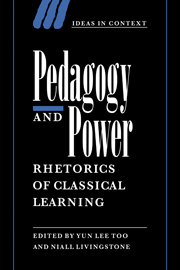Book contents
- Frontmatter
- Contents
- Notes on contributors
- Acknowledgements
- Introduction
- 1 Classics: from discipline in crisis to (multi-)cultural capital
- 2 Schoolboys and gentlemen: classical pedagogy and authority in the English public school
- 3 ‘Die Zung’ ist dieses Schwert': classical tongues and gendered curricula in German schooling to 1908
- 4 ‘What does that argue for us?’: the politics of teaching and political education in late eighteenth-century dialogues
- 5 Women and classical education in the early modern period
- 6 Pilgrimage to Parnassus: local intellectual traditions, humanist education and the cultural geography of sixteenth-century England
- 7 ‘Not so much praise as precept’: Erasmus, panegyric, and the Renaissance art of teaching princes
- 8 Teachers, pupils and imperial power in eleventh-century Byzantium
- 9 Reading power in Roman Greece: the paideia of Dio Chrysostom
- 10 Children, animals, slaves and grammar
- 11 A good man skilled in politics: Quintilian's political theory
- 12 The voice of Isocrates and the dissemination of cultural power
- 13 Xenophon's Cyropaedia: disfiguring the pedagogical state
- Select bibliography
- Index
- IDEAS IN CONTEXT
3 - ‘Die Zung’ ist dieses Schwert': classical tongues and gendered curricula in German schooling to 1908
Published online by Cambridge University Press: 30 September 2009
- Frontmatter
- Contents
- Notes on contributors
- Acknowledgements
- Introduction
- 1 Classics: from discipline in crisis to (multi-)cultural capital
- 2 Schoolboys and gentlemen: classical pedagogy and authority in the English public school
- 3 ‘Die Zung’ ist dieses Schwert': classical tongues and gendered curricula in German schooling to 1908
- 4 ‘What does that argue for us?’: the politics of teaching and political education in late eighteenth-century dialogues
- 5 Women and classical education in the early modern period
- 6 Pilgrimage to Parnassus: local intellectual traditions, humanist education and the cultural geography of sixteenth-century England
- 7 ‘Not so much praise as precept’: Erasmus, panegyric, and the Renaissance art of teaching princes
- 8 Teachers, pupils and imperial power in eleventh-century Byzantium
- 9 Reading power in Roman Greece: the paideia of Dio Chrysostom
- 10 Children, animals, slaves and grammar
- 11 A good man skilled in politics: Quintilian's political theory
- 12 The voice of Isocrates and the dissemination of cultural power
- 13 Xenophon's Cyropaedia: disfiguring the pedagogical state
- Select bibliography
- Index
- IDEAS IN CONTEXT
Summary
When modern scholars trace the lives and achievements of educated women in Europe, two aspects of their accounts are consistently striking: first, that the most telling method of measuring learning before the twentieth century is by knowledge of the classical languages, and second, that women who command such knowledge are by definition exceptional. They are worthy of note in a way that the multitudes of classically-educated men cannot be. There is traditionally something masculine in the command of Latin or Greek, and this masculinity is reflected and perpetuated in the history of schooling: it finds expression in pedagogical notions of the need to silence and domesticate women while linguistically enabling men to participate in public life, as well as in anthropological ideas regarding women's non-intellectual nature. Valuable research has been done on the development of girls' schooling, and the intellectual education of women, often against the odds, has been charted in various periods; nonetheless, there can be no question of educational equality until there is curricular equality in schools, and an effective yardstick is the availability of Latin and Greek.
The states of the Holy Roman Empire, which asserted their Germanic identity in the appendage deutscher Nation (of the German Nation) from 1474, provide an interesting location in which to observe the workings of classical pedagogues and their powerful perpetuation of gendered pedagogy.
- Type
- Chapter
- Information
- Pedagogy and PowerRhetorics of Classical Learning, pp. 47 - 66Publisher: Cambridge University PressPrint publication year: 1998
- 1
- Cited by

